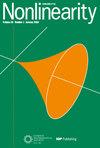非线性耗散 SPDE 的线性和分数响应
IF 1.6
2区 数学
Q2 MATHEMATICS, APPLIED
引用次数: 0
摘要
本文为一类非线性随机偏微分方程(SPDE)提供了一个建立响应理论的框架。更具体地说,研究表明,对于某一类观测值,这些观测值相对于 SPDE 静止度量的平均值是可微分的(线性响应),或者在较弱条件下,局部荷尔德连续的(分数响应),作为确定性加法强迫的函数。该方法允许考虑不一定可变的观测变量。对于这类观测变量,最近已经建立了与 SPDE 相关的马尔可夫半群的谱间隙结果,这些结果非常容易获得。这在这里非常重要,因为谱差距是建立线性响应的一个主要因素。这些结果被应用于二维随机纳维-斯托克斯方程和随机双层准地养模型,后者是地球科学领域常用的研究大气和海洋动力学的中等复杂度模型。研究地球物理流体动力学模型对强迫扰动的响应的物理动机来自气候变化,并涉及在当前条件下得出的动力学统计特性在不同强迫情景下是否有效的问题。本文章由计算机程序翻译,如有差异,请以英文原文为准。
Linear and fractional response for nonlinear dissipative SPDEs
A framework to establish response theory for a class of nonlinear stochastic partial differential equations (SPDEs) is provided. More specifically, it is shown that for a certain class of observables, the averages of those observables against the stationary measure of the SPDE are differentiable (linear response) or, under weaker conditions, locally Hölder continuous (fractional response) as functions of a deterministic additive forcing. The method allows to consider observables that are not necessarily differentiable. For such observables, spectral gap results for the Markov semigroup associated with the SPDE have recently been established that are fairly accessible. This is important here as spectral gaps are a major ingredient for establishing linear response. The results are applied to the 2D stochastic Navier–Stokes equation and the stochastic two–layer quasi–geostrophic model, an intermediate complexity model popular in the geosciences to study atmosphere and ocean dynamics. The physical motivation for studying the response to perturbations in the forcings for models in geophysical fluid dynamics comes from climate change and relate to the question as to whether statistical properties of the dynamics derived under current conditions will be valid under different forcing scenarios.
求助全文
通过发布文献求助,成功后即可免费获取论文全文。
去求助
来源期刊

Nonlinearity
物理-物理:数学物理
CiteScore
3.00
自引率
5.90%
发文量
170
审稿时长
12 months
期刊介绍:
Aimed primarily at mathematicians and physicists interested in research on nonlinear phenomena, the journal''s coverage ranges from proofs of important theorems to papers presenting ideas, conjectures and numerical or physical experiments of significant physical and mathematical interest.
Subject coverage:
The journal publishes papers on nonlinear mathematics, mathematical physics, experimental physics, theoretical physics and other areas in the sciences where nonlinear phenomena are of fundamental importance. A more detailed indication is given by the subject interests of the Editorial Board members, which are listed in every issue of the journal.
Due to the broad scope of Nonlinearity, and in order to make all papers published in the journal accessible to its wide readership, authors are required to provide sufficient introductory material in their paper. This material should contain enough detail and background information to place their research into context and to make it understandable to scientists working on nonlinear phenomena.
Nonlinearity is a journal of the Institute of Physics and the London Mathematical Society.
 求助内容:
求助内容: 应助结果提醒方式:
应助结果提醒方式:


